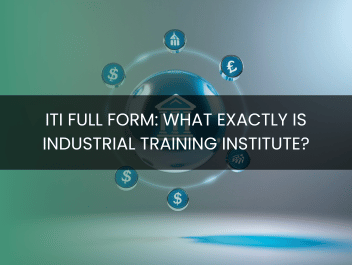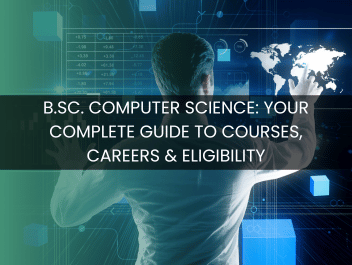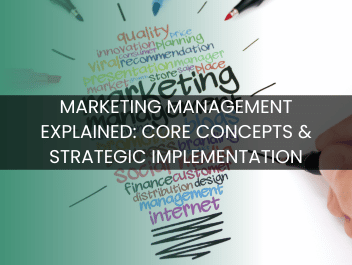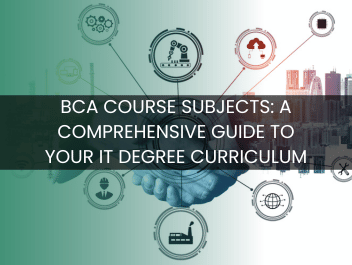
High-Paying Career Paths for Girls After 12th Commerce
Choosing the best courses after 12th commerce for girl students can shape their future towards high-paying career paths and professional excellence. With a myriad of options available, identifying the best professional courses after 12th commerce for girl students can be a daunting task. Understanding the landscape of opportunities is crucial for making informed decisions.
Commerce streams often lead to some of the best course for girl after 12, offering lucrative and satisfying careers. From becoming a financial expert to mastering corporate governance, these courses provide diverse pathways. With the right guidance, girls can find the best professional courses after 12th commerce for girls that align with their interests and aspirations.
This article unveils high-paying career paths through a variety of courses for girls after 12th. From Chartered Accountancy to Digital Marketing, explore the top courses that promise growth and success. Ready to discover your potential after 12th commerce? Let’s dive in!
Table of Content
- 1. Chartered Accountancy (CA): Pathway to Financial Expertise
- 2. Company Secretary (CS): Master of Governance
- 3. Bachelor of Business Administration (BBA): Leadership and Management
- 4. Bachelor of Economics: The Key to Financial Systems
- 5. Bachelor of Commerce (BCom): Foundation for a Sound Career
- 6. Digital Marketing: Thrive in the Digital World
- 7. BA LLB: Dual Degree for Legal Minds
- 8. Financial Analytics: Data-Driven Decision Making
- 9. Hospitality Management: The Art of Service and Business
- 10. Certified Financial Planner (CFP): Personal Finance Advisory
- 11. E-Commerce: Business in the Virtual Space
- 12. Entrepreneurship: Blaze Your Trail
- 13. Start Your Journey
- 14. Human Resource Management: People and Talent
- 15. Supply Chain Management: Efficiency in Operations
- 16. Marketing and Advertising: Creative Career Moves
- 17. Banking and Insurance: Safeguard and Grow Wealth
- 18. Event Management: Mastering the Art of Organization
- 19. Real Estate Management: Navigate Property Markets
- 20. International Business: Global Trade and Relations
- 21. Public Relations: Build and Manage Reputations
- 22. Tax Consultancy: Money Matters and Compliance
Chartered Accountancy (CA): Pathway to Financial Expertise
Chartered Accountancy (CA) is a prestigious career path for those seeking financial expertise. It provides a strong foundation in financial management, accounting principles, and business laws. This makes CA a popular choice among students who have completed 12th commerce.
Key Components of CA:
- Foundation Course: The journey begins with a foundational understanding of accounting, economics, and business laws.
- Intermediate Course: Deepens knowledge with subjects like financial accounting, tax laws, and cost accounting.
- Final Course: Focuses on advanced topics, including corporate governance, strategic financial management, and international taxation.
Why Choose CA?
- Wide Range of Career Options: From financial
analyst roles to corporate governance positions, CAs have a broad scope.
- Highly Rewarding Career: CAs often enjoy competitive salaries and job
stability.
- Global Recognition: A CA qualification opens up international job
opportunities.
CA Course Duration:
- Typically spans 3 to 5 years, depending on individual pace and success in exams.
In summary, Chartered Accountancy is a challenging but rewarding career path that equips students with critical financial skills and a wide range of job opportunities.
Company Secretary (CS): Master of Governance
The role of a Company Secretary (CS) is pivotal in ensuring corporate governance and legal compliance. A CS acts as a bridge between the company and its stakeholders, guaranteeing that all regulatory requirements are met.
Key Responsibilities:
- Ensuring company compliance with legal and regulatory
requirements.
- Advising the board of directors on governance practices.
- Managing shareholder relations and communication.
Career Prospects and Benefits:
- Wide Range of Opportunities: Work in diverse
sectors, including finance, law, and public policy.
- High-Salary Course: On average, salaries for CS professionals are
lucrative and competitive.
- Strong Foundation: Offers a solid understanding of business law,
corporate governance, and financial planning.
Qualification Path:
Becoming a CS involves completing a 3-year course consisting of multiple levels and passing requisite exams. This is accessible through online courses and recognized institutes, offering flexibility and convenience.
In summary, pursuing a career as a Company Secretary not only provides a rewarding career but also equips you with the skills needed for exceptional corporate governance. For more details on CS, visit mindgroom.in.
Bachelor of Business Administration (BBA): Leadership and Management
The Bachelor of Business Administration (BBA) specializing in Leadership and Management is a popular choice for students aiming for a rewarding career in business. This 3-year course offers a strong foundation in key business principles, including financial management, human resources, and corporate governance.
BBA programs prepare students for a wide range of career paths. Graduates often pursue roles in business administration, financial planning, and digital marketing. With an emphasis on leadership, students develop skills in decision-making, strategic planning, and effective communication.
Key Aspects of BBA in Leadership and Management:
- Course Duration: 3 years
- Key Subjects: Business law, corporate governance, financial analysis
- Career Opportunities: Business administrator, financial analyst, legal
advisor
- Average Salaries: Competitive, with significant growth potential
Short, focused study sessions, interactive learning, and online courses make this program appealing. The BBA in Leadership and Management is ideal for those aiming to enhance their career prospects and achieve their career goals. Graduating with this degree opens doors to high-salary courses and job opportunities across various industries.
Bachelor of Economics: The Key to Financial Systems
A Bachelor of Economics provides a strong foundation in understanding financial systems. It’s a 3-year course focusing on economic theories, financial planning, and business law. Graduates find numerous job opportunities in roles like financial analyst, legal advisor, and corporate governance specialist.
Studying economics equips you with insights into financial management and average salaries, making it a popular choice for those pursuing a rewarding career. The course offers a wide range of career prospects, from understanding legal aspects to mastering digital marketing strategies.
Here is a quick list of potential career paths:
- Financial Analyst: Analyze financial data and
trends.
- Legal Advisor: Provide legal counsel in business settings.
- Digital Marketer: Develop online marketing strategies.
The Bachelor of Economics is ideal for those who wish to build a career in business administration and financial systems. With diverse professional courses and career options post-graduation, this degree is certainly a key to unlocking high-salary courses and a fulfilling career.
Bachelor of Commerce (BCom): Foundation for a Sound Career
The Bachelor of Commerce (BCom) is an excellent course for girls after 12th commerce. It provides a strong foundation in business, finance, and management. This 3-year course offers a wide range of career prospects. BCom is one of the best professional courses after 12th commerce for girls.
Benefits of Choosing BCom:
- Diverse Specializations: Choose from
specializations like Accounting, Finance, and Marketing.
- Strong Foundation: Gain knowledge in financial management and business
law.
- Career Path: Opens doors to careers as financial analysts, human
resources managers, or digital marketers.
Potential Career Options:
|
Career Option |
Average Salaries |
|
Financial Analyst |
Competitive |
|
Human Resources Manager |
Competitive |
|
Digital Marketing Expert |
Competitive |
The BCom course also includes legal aspects and corporate governance, preparing students for roles such as legal advisor or event manager. Opting for BCom after 12th commerce for girls ensures access to high-salary courses and rewarding career opportunities. Consider enrolling in this popular choice to achieve your career goals.
Digital Marketing: Thrive in the Digital World
Digital marketing is an essential tool in today's tech-driven environment. With the rise of online platforms, businesses seek professionals skilled in this area. It's a discipline that blends creativity, analytics, and technology to promote brands.
Key Components of Digital Marketing:
- SEO (Search Engine Optimization): Improves website
visibility.
- Social Media Marketing: Engages audiences on platforms like Facebook
and Instagram.
- Content Marketing: Produces valuable content to attract and retain
customers.
Benefits of Digital Marketing:
- Wide Reach: Connects with a global audience.
- Cost-Effective: Often cheaper than traditional marketing.
- Measurable Results: Track campaign performance in real-time.
Digital marketing offers a rewarding career with diverse job opportunities. Skills in this field open doors to roles such as digital marketer, SEO specialist, and content creator. Enhanced by online courses, digital marketing provides flexible learning paths to fit any schedule.
In summary, as businesses shift to digital spaces, mastering digital marketing is crucial for both professionals and organizations aiming for success.
BA LLB: Dual Degree for Legal Minds
The BA LLB is an outstanding option for anyone interested in law and legal studies. This dual degree integrates Bachelor of Arts (BA) and Bachelor of Laws (LLB). It creates a robust foundation for future legal minds.
Benefits of BA LLB:
- Comprehensive Learning: Covers subjects like
Political Science, Sociology, History, and Law.
- Diverse Career Pathways: Opens doors to careers like legal advisor,
corporate governance expert, or business law specialist.
- Job Opportunities: Graduates can work in law firms, corporate sector,
or government agencies.
- Average Salaries: Lucrative rewards with potential for strong
financial growth.
Course Structure:
- Duration: Typically a 5-year course.
- Certification: Dual degree upon completion.
This program caters to those with a passion for legal studies, offering a wide range of career prospects. Perfect for building a rewarding career with both legal expertise and a strong understanding of the arts.
Financial Analytics: Data-Driven Decision Making
Financial Analytics: Data-Driven Decision Making plays a critical role in today's business world. By analyzing financial data, companies can make informed decisions that drive growth and profitability.
Key Elements of Financial Analytics:
- Data Collection: Gathering data from various sources like sales, expenses, and market trends.
- Analysis Techniques: Using methods such as statistical analysis and predictive modeling to interpret data.
- Decision Making: Leveraging insights to make strategic business choices.
Benefits:
- Improved Financial Planning: Accurate forecasts
help in budgeting and resource allocation.
- Risk Management: Identifies potential financial risks and mitigates
them.
- Performance Measurement: Assesses company performance against
financial goals.
A strong foundation in Financial Analytics provides professionals with the tools they need for effective financial management. This data-driven approach ensures that businesses remain competitive and agile in a fast-paced market. The adoption of Financial Analytics allows organizations to not only maximize their profits but also enhance operational efficiency and respond quickly to market changes. Embracing this data-driven strategy is essential for any business aiming to achieve long-term financial success.
Hospitality Management: The Art of Service and Business
Hospitality management is a dynamic field that blends service with business acumen. This discipline focuses on creating exceptional customer experiences while ensuring efficient operations. Professionals in this field are skilled in various areas including event management, hotel operations, and food service.
Key Aspects of Hospitality Management:
- Customer Service: Excellence in service is the
cornerstone.
- Business Operations: Maintaining profitability and efficiency.
- Event Planning: Organizing and executing events to perfection.
Career Opportunities:
- Hotel Manager
- Event Coordinator
- Restaurant Manager
Hospitality management offers a rewarding career with diverse job opportunities. Graduates can find roles in hotels, resorts, and restaurants, as well as cruise lines and event planning companies. The industry is known for offering a wide range of career paths, allowing individuals to specialize in areas like financial management or digital marketing within the hospitality context.
The average salaries in hospitality management can vary. However, with experience and dedication, this field offers substantial growth and job satisfaction. It’s a top choice for those passionate about service and business.
Certified Financial Planner (CFP): Personal Finance Advisory
Becoming a Certified Financial Planner (CFP) is an excellent career move for those passionate about personal finance advisory. This certification opens doors to various career prospects and job opportunities. As a CFP, you'll guide clients in financial planning, investment management, and retirement strategies.
Key Benefits of CFP:
- Comprehensive Expertise: Gain in-depth knowledge in personal finance, tax planning, and estate management.- High-Salary Potential: CFPs often command attractive salaries, reflecting their specialized skills.
- Wide Range of Opportunities: From working in financial firms to offering freelance consultant services, the options are vast.
Requirements:
- Bachelor's Degree
- Financial Planning Coursework
- Pass the CFP Exam
- Relevant Work Experience
Table: Average CFP Salaries
|
Country |
Average Salary (USD) |
|
USA |
$89,000 |
|
Canada |
$75,000 |
|
UK |
£45,000 |
A CFP designation provides a strong foundation for a rewarding career in finance. It's a popular choice among professionals aiming to make a significant impact in personal finance advisory.
E-Commerce: Business in the Virtual Space
E-commerce revolutionizes how businesses interact with consumers. Online platforms enable seamless buying and selling of goods and services. This digital arena offers businesses a global reach, extending beyond traditional borders.
Key Benefits of E-Commerce:
- Accessibility: Online stores operate 24/7, offering
convenience for shoppers worldwide.
- Cost Efficiency: Reduced overhead costs compared to physical stores.
- Data Insights: Businesses gain valuable consumer behavior insights
through analytics.
Popular E-Commerce Models:
|
Model |
Description |
|
B2C (Business to Consumer) |
Direct sales from businesses to individuals. |
|
B2B (Business to Business) |
Transactions between businesses. |
|
C2C (Consumer to Consumer) |
Individuals selling to each other, often via platforms like eBay. |
Security and trust remain crucial as e-commerce expands. Implementing measures such as secure payment gateways and data protection enhances customer trust.
Overall, e-commerce presents a flexible and efficient business model in today's digital economy. Its growth continues to shape the future landscape of global trade.
Entrepreneurship: Blaze Your Trail
Entrepreneurship is the art of creating and managing a business. It's about taking risks, solving problems, and making your unique mark on the world. For those with a vision, entrepreneurship offers endless opportunities.
Why Choose Entrepreneurship?
- Independence: Be your own boss.
- Innovation: Bring fresh ideas to life.
- Growth Potential: Scale your business for success.
- Impact: Make a difference in your community.
Key Skills
- Problem-Solving: Find creative solutions to
challenges.
- Leadership: Guide your team with confidence.
- Financial Management: Handle funds wisely for sustainable growth.
| Skill | Importance |
|--------------|----------------|
| Adaptability | High |
| Networking | Critical |
Start Your Journey
Begin with a strong business plan. Identify your market, understand your customers, and outline your goals. With determination and grit, you can thrive in the world of entrepreneurship. Blaze your trail and transform your dream into reality!
Stock Market Expert: Dive Into Investments
Becoming a Stock Market Expert is a journey into the exciting world of investments. This path is both rewarding and dynamic, offering vast opportunities for growth and profit.
Benefits of Being a Stock Market Expert:
- Deep understanding of financial markets- Ability to analyze trends and predict market movements
- High earning potential
Steps to Become a Stock Market Expert:
- Educate Yourself: Begin with courses or certifications in finance, such as a Chartered Financial Analyst (CFA) program.
- Gain Practical Experience: Work with brokerage firms or financial institutions.
- Stay Informed: Regularly read financial news and updates.
- Practice: Use simulated trading platforms to refine your skills.
Potential Career Paths:
- Financial Analyst
- Investment Banker
- Portfolio Manager
The demand is high for professionals who can navigate the stock market's complexities. Whether working independently or with a firm, the role is crucial in financial management. By analyzing market trends and capitalizing on investment opportunities, a stock market expert can help shape clients' financial futures, leading to a fulfilling and lucrative career.
Human Resource Management: People and Talent
Human Resource Management (HRM) focuses on managing people and talent in organizations. It plays a key role in ensuring businesses have the right people in the right positions. HRM tasks include recruitment, training, performance assessment, and employee relations.
Key Aspects of HRM:
- Recruitment and Selection: Finding and hiring the best candidates.
- Training and Development: Providing growth opportunities and skills enhancement.
- Performance Management: Evaluating and improving employee performance.
- Employee Relations: Fostering a positive work environment and resolving conflicts.
HRM is crucial for aligning staff with company goals, boosting morale, and maintaining high productivity. By focusing on talent management, HR professionals ensure a well-rounded, motivated workforce ready to tackle organizational challenges. This not only enhances employee satisfaction but also promotes a thriving business culture.
In HRM, strategic planning and effective communication are vital. By leveraging these, companies can maintain a competitive edge through their skilled, satisfied, and engaged workforce.
Supply Chain Management: Efficiency in Operations
Supply Chain Management (SCM) is crucial for achieving operational efficiency. It involves streamlining the entire production flow of goods and services. Companies can greatly enhance their performance by focusing on SCM.
Key Components of Supply Chain Management:
- Procurement: Acquiring raw materials efficiently.
- Production: Ensuring optimized processes.
- Distribution: Swift delivery to consumers.
- Logistics: Managing transport to cut costs.
A successful SCM strategy can reduce costs and time, optimizing operations. Businesses can experience notable improvements in efficiency by aligning resources and strategies properly.
|
SCM Aspect |
Efficiency Focus |
|
Procurement |
Sourcing competitively and responsibly |
|
Production |
Utilizing technology and lean practices |
|
Distribution |
Expanding networks and improving speed |
|
Logistics |
Leveraging data analytics and automation |
By focusing on these components, companies can reap the benefits of streamlined operations. This creates a robust framework for long-term success.
In conclusion, effective Supply Chain Management leads to better resource use, cutting unnecessary expenses, and boosting overall productivity—attributes essential for any organization's success.
Marketing and Advertising: Creative Career Moves
Marketing and advertising present exciting and creative career moves, especially for those with a knack for innovation and communication. These fields offer a wide range of opportunities, from digital marketers to brand strategists.
Key Career Paths:
- Digital Marketing: Engages audiences online,
employing strategies such as Social Media Marketing and Search Engine
Optimization.
- Creative Director: Oversees visual elements of advertising campaigns
and ensures alignment with brand messaging.
- Content Strategist: Develops compelling content that drives engagement
and meets marketing objectives.
Average Salaries:
|
Position |
Average Salary per Year |
|
Digital Marketer |
$50,000 |
|
Creative Director |
$88,000 |
|
Content Strategist |
$70,000 |
Pursuing a career in marketing and advertising offers the potential for high-salary roles and a rewarding career path. With the rise of online courses, honing these skills is more accessible than ever. A career in this field not only fosters creativity but also ensures strong career prospects in a dynamic environment.
Banking and Insurance: Safeguard and Grow Wealth
Banking and Insurance play a critical role in safeguarding and growing wealth. They provide a financial safety net and investment opportunities.
Key Functions of Banking:
- Secure Savings: Banks offer savings accounts to
keep your money safe while earning interest.
- Investment Opportunities: Through banks, you can access various
investment products like mutual funds and fixed deposits.
Key Functions of Insurance:
- Risk Management: Insurance protects against
unforeseen events, such as health issues or accidents.
- Wealth Preservation: Policies like life insurance ensure financial
security for families.
Comparison Table: Banking vs. Insurance
|
Feature |
Banking |
Insurance |
|
Purpose |
Wealth growth through interest |
Wealth protection via coverage |
|
Risk Level |
Generally low |
Varies by policy type |
Both banking and insurance services are essential for achieving a balanced financial portfolio. They complement each other by providing both growth and security.
Utilizing these services wisely can help achieve long-term financial goals and offer peace of mind.
Event Management: Mastering the Art of Organization
Event Management: Mastering the Art of Organization involves various skills. It is about planning, coordinating, and executing events. This can range from small gatherings to large conferences. Here's a breakdown of key elements:
- Planning: This is the initial phase where objectives are set. It involves selecting venues, scheduling, and budgeting.
- Coordination: Here, event managers work with teams like catering, decoration, and security to ensure everything runs smoothly.
- Execution: This is the final phase. It involves managing the event on the day, making sure everything goes as planned.
|
Key Skills |
Description |
|
Communication |
Clear interaction with clients and teams |
|
Organization |
Keeping track of logistics and timelines |
|
Problem-Solving |
Addressing unforeseen issues smoothly |
A career in Event Management offers diverse opportunities. This can lead to roles like Event Coordinator or Project Manager. With a rewarding career in this field, you gain a wide range of experience that enhances your professional growth. These skills are crucial in making any event successful, ensuring a seamless experience for attendees.
Real Estate Management: Navigate Property Markets
Real Estate Management: Navigate Property Markets is crucial for those seeking to excel in property markets. Understanding real estate management is paramount. It involves overseeing properties to ensure their longevity and profitability.
Key Areas of Real Estate Management:
- Property Maintenance: Regular upkeep to retain
value.
- Financial Management: Budgeting, tax planning, and forecasting.
- Tenant Relations: Ensuring tenant satisfaction and lease negotiations.
Why Embrace Real Estate Management?
- Diverse Opportunities: From residential to commercial property management.
- Financial Reward: Offers a steady income stream and investment growth.
- Market Insight: Understanding trends helps navigate property markets effectively.
Benefits of Real Estate Management:
- Better management leads to higher property values.
- Efficiently structured operations save time and money.
Example Table: Skills Required
|
Skill |
Description |
|
Communication |
Clear interaction with tenants/staff |
|
Organization |
Efficient property oversight |
|
Problem-Solving |
Addressing maintenance and tenant issues |
In summary, Real Estate Management is essential for navigating property markets. It offers diverse opportunities and financial rewards. By honing your skills in this field, you can manage properties more effectively and enhance their value.
International Business: Global Trade and Relations
International Business: Global Trade and Relations is a crucial aspect of the global economy. It involves the exchange of goods, services, and capital across international borders. This dynamic field requires understanding diverse cultural, economic, and legal environments.
Key Components:
- Global Markets: Companies leverage global markets to increase sales and profits. They tap into different regions to reach a wider customer base.
- Trade Relations: International trade relations facilitate peace and mutual economic growth. Countries negotiate trade agreements to reduce barriers such as tariffs.
- Cultural Dynamics: Understanding cultural differences is vital. It influences marketing strategies, negotiations, and management.
- Legal Frameworks: Businesses must comply with various international laws and regulations. This includes trade agreements and intellectual property rights.
Benefits:
- Access to new markets
- Diverse product offerings
- Economic growth
Challenges:
- Navigating complex regulations
- Currency fluctuations
- Political instability
|
Opportunity |
Challenge |
|
Increased Market Reach |
Regulatory Compliance |
|
Skilled Workforce |
Cultural Sensitivity |
International Business is foundational for companies looking to thrive in today's interconnected world. It offers vast opportunities but necessitates careful strategizing and adaptability.
Public Relations: Build and Manage Reputations
Public Relations (PR) is a critical field focused on building and managing reputations. It involves creating a positive image and maintaining strong public relations for individuals or organizations.
A key aspect of PR is media relations, where professionals engage with journalists to craft compelling stories. Effective communication strategies are vital to influencing public perception and enhancing brand visibility.
Another crucial element is crisis management. This involves responding promptly to negative situations to protect an organization's image. PR professionals develop strategies to mitigate damage and restore trust.
Social media plays a pivotal role in modern PR. Platforms like Twitter and Instagram allow for direct interaction with the public, making it easier to address concerns and share positive news.
A PR professional's skill set should include excellent communication, strategic thinking, and empathy. These skills enable them to develop authentic messages that resonate with audiences.
Table: Key PR Functions
|
Function |
Description |
|
Media Relations |
Building relationships with media to secure positive coverage. |
|
Crisis Management |
Handling adverse events to maintain a positive reputation. |
|
Social Media |
Engaging with the public to promote and protect brand image. |
Public relations is essential for managing perceptions and achieving long-term success in any industry.
Actuarial Science: Risk Assessment and Analysis
Actuarial Science is a field focused on risk assessment and analysis. It combines mathematics, statistics, and financial theory to study uncertain events. Actuaries help organizations plan for the future by evaluating financial risks.
Key Aspects of Actuarial Science:
- Risk Assessment: Actuaries analyze data to estimate
the probability and impact of future events.
- Financial Theory: They use financial principles to ensure
organizations make sound economic decisions.
- Mathematics and Statistics: These are essential tools for actuaries to
model and predict outcomes accurately.
Career Prospects:
Actuarial Science offers a rewarding career with strong job opportunities. Roles can be found in insurance, finance, and pensions. Actuaries often engage in financial planning, shaping corporate strategies based on risk assessments.
Basic Skills Required:
- Strong foundation in mathematics.
- Proficiency in statistics.
- Understanding of business and economics.
Sample Job Roles:
- Financial Analyst
- Risk Manager
- Insurance Underwriter
Actuaries play a vital role in navigating financial uncertainties, making it a popular and well-compensated career choice. Consider this dynamic field if you are detail-oriented with a passion for numbers and problem-solving.
Tax Consultancy: Money Matters and Compliance
Tax consultancy is essential for managing money matters and ensuring compliance with tax regulations. It plays a crucial role in helping individuals and businesses navigate the complexities of tax laws.
A tax consultant provides expert advice on minimizing tax liabilities and maximizing tax returns. They analyze clients' financial situations to offer tailored solutions. Their services include tax planning, filing returns, and advising on legal aspects.
Here’s a brief overview of key benefits:
- Tax Planning: Strategizes to reduce taxable income.
- Compliance: Ensures adherence to tax laws, avoiding penalties.
- Financial Analysis: Assesses financial status for optimal tax
strategies.
Tax Consultancy Services
|
Service |
Benefits |
|
Tax Filing |
Looking For Job Satisfaction on the long run?
Please feel free to contact our experts
Call to ask any question
+91-9319336222Monday to Saturday
(9:00 AM to 8:00 PM)Resent Blogs
10 Things to Do During an Interview to Impress Your Future Employer
Learn MoreCrafting Your Personal Narrative: A Guide to Writing About Yourself
Learn MoreTop 10 Essential Interview Questions and Expert Answers for 2025
Learn MoreAce Your Next Interview: Essential Questions and Expert Answers for 2025
Learn MoreFirst-Time Manager Interview: Crucial Questions and Strategies for Success
Learn More150 Essential General Knowledge Questions for Interviews in 2025
Learn MoreMaster the Google Interview: Strategies for Success in 2025
Learn MoreHow Can You Describe Yourself Professionally? 5 Key Strategies You Need to Know
Learn MoreMastering the Art of How to Take Interview: Essential Techniques for Success
Learn More25 Essential HR Interview Questions and Answers PDF You Can't Ignore
Learn More7 Tips to Ace Your HR Screening Round and Land Your Dream Job
Learn More10 Essential Tips for Acing Your Interview Exam
Learn More5 Unique Interview Format Examples to Stand Out in Your Next Interview
Learn More5 Powerful Techniques for a Memorable Interview Introduction
Learn MoreMaster Your Next Interview with These Top Interview Preparation Apps
Learn MoreMastering the Art: Top Interview Questions for 12th Class Students
Learn More7 Must-Know Interview Questions for Freshers to Ace Your Job Hunt
Learn MoreMastering Interview Questions for HR Position with Answers: Strategies for Success
Learn More12 Essential Interview Questions for Recruiter Position You Should Prepare For
Learn More10 Must-Know Interview Questions UK Employers Love to Ask
Learn More10 Creative Interview Writing Examples to Spark Your Imagination
Learn More15 Essential Managerial Interview Questions for Freshers to Prepare
Learn More15 Unique Marketing Interview Questions You Haven't Prepared For
Learn More7 Key Strategies for a Successful Mock Interview Session
Learn MoreThe Ultimate Guide to Model Interview Questions: What You Need to Know
Learn More5 My Self Question Exercises to Unlock Your True Potential
Learn More10 Normal Questions That Can Spark Deep Conversations
Learn More15 Essential Personal Interview Questions for Freshers to Ace Your Next Job
Learn More10 Essential Phone Interview Questions You Can’t Afford to Ignore
Learn More15 Essential Sales Interview Questions and Answers for Freshers
Learn More7 Key Situational Interview Questions Every Employer Should Ask
Learn More15 Essential Software Developer HR Interview Questions You Need to Prepare For
Learn MoreMastering the Technical Interview: Essential Questions and Answers
Learn MoreTop Strategies for Responding to Tell Me About Yourself in a Student Interview
Learn MoreTop 10 Interview Questions and Expert Answers
Learn MoreMastering the Art of Interviewing: 50 Tough Questions and Smart Answers
Learn MoreHow to Ace Your Next Mock Interview: Tips and Strategies for Success
Learn MoreYour Ultimate Guide: 60 Insightful Questions to Ask Interviewers
Learn MoreCrafting the Perfect Response to Why Do You Want This Job?
Learn MoreUnique Ways to Tackle the Question Why Should We Hire You?
Learn MoreWhy Should We Hire You? - Top 10 Answers for Customer Service Roles
Learn MoreMastering the Art of Discussing Work Experience in Interviews
Learn MoreMastering Your Sales Interview: 50 Essential Questions and Answers
Learn MoreCareer Paths After 12th Commerce: Your Future Starts Here
Learn MoreExplore One-Year Courses After 12th for Non-Medical Students
Learn MoreQuick Career Paths: 2-Year Degree Courses After 12th for Fast-Track Success
Learn MoreComprehensive Guide: Courses After 12th Commerce
Learn MoreTop 10 Lucrative Courses to Consider After Completing Engineering
Learn MoreAdvancing Your Career: Top Choices After B.Tech in 2025
Learn MoreExplore Your Future: After CET Exam Which Course is Best for Aspiring Professionals?
Learn More5 Reasons Why After Inter CEC, Choosing the Right Course is Crucial
Learn MoreAfter PUC Which Course is Best for Aspiring Engineers? Explore Your Options!
Learn MoreUnlocking Your Future: Best Arts and Science Courses After 12th for 2025
Learn MoreWhy a Bachelor Degree in Commerce is Your Pathway to Success
Learn More15 Best Career Courses to Boost Your Earning Potential in 2025
Learn MoreEmerging Career Fields for 2025: What You Need to Know
Learn MoreExploring In-Demand Career Paths After 12th: Science, Arts, Commerce
Learn More15 Lucrative Science Careers You Should Consider
Learn MoreHigh-Paying Career Paths for Girls After 12th Commerce
Learn MoreTop 10 High Salary Career Courses After 12th Biology
Learn MoreTop 10 High-Paying BSc Specializations for 2025
Learn MoreExploring the Future: Innovative Career Paths for B.Tech Graduates in 2025
Learn MoreComprehensive Guide to B.Tech Specializations for MPC Graduates
Learn MoreUnlocking Your Potential: The Ultimate B Tech Job List for 2025
Learn MoreB.Tech Salary Insights: How Much Can You Earn Per Month?
Learn MoreEssential Business Courses After 12th: Your Guide to a Successful Career
Learn MoreHow Commerce Students Can Transition to BSc IT
Learn MoreExploring Career Paths After 12th: Your Guide to Success in 2025
Learn MoreCertainly! Here are 10 additional title ideas inspired by the list you provided
Learn MoreExploring Career Paths After Engineering: Your Guide to the Future
Learn MoreThe Ultimate Guide to Career Options Post-High School Graduation
Learn MoreDiscover the Top 10 Chemistry Courses After 12th That Lead to High-Paying Jobs
Learn MoreExplore the Best Diploma and Certificate Programs After 12th Commerce
Learn MoreCareer Paths for Computer Science Graduates: Top Opportunities to Explore
Learn MoreExplore Top Courses After 12th: Your Path in Science, Arts, or Commerce
Learn MoreTop 10 Courses After 12th Commerce for a Successful Career
Learn MoreTop Paying Professional Courses After 12th for Commerce Students
Learn MoreEmerging Career Paths After 12th Commerce Without Maths
Learn MoreExploring Career Paths After 12th Science: A Complete Guide
Learn MoreComprehensive Guide to Courses and Career Paths after 12th Grade
Learn MoreEmerging Career Paths in India: What to Expect in 2025
Learn MoreTop Diploma Paths for Students After Completing 12th Science
Learn MoreTop 15 Easiest High-Paying Jobs to Pursue in India by 2025
Learn MoreNavigating Your Future: Easy Degree Options After 12th
Learn MoreExploring Top Engineering Branches After 12th: A Comprehensive Guide
Learn MoreExploring Advanced Studies: Top Entrance Exams for Engineering Graduates
Learn MoreMBA Salary Insights: Top Packages and Compensation Trends in India
Learn MoreTop 15 Lucrative Careers in India for 2025
Learn MoreTop 10 High-Paying Jobs for Commerce Graduates Without Maths
Learn MoreTop 10 High Salary Courses After 12th PCB for Future Success
Learn MoreHigh-Earning Courses to Pursue After 12th Science in 2025
Learn MoreHigh Paying Career Paths for BiPC Students: Top 10 Courses to Consider
Learn MoreExploring High-Paying Engineering Degrees for the Future
Learn MoreExploring Integrated Courses After 12th: A Comprehensive Guide for Students
Learn MoreExploring Career Prospects: What Can You Do with a BBA Degree?
Learn MoreTop 15 In-Demand Professional Courses for Commerce Graduates in 2025
Learn MoreExploring Lucrative Job Paths for BBA Graduates in 2025
Learn MoreMBA Full Form Explained: Master of Business Administration & Its Strategic Career Value
Learn MoreBBA Full Form: The Definitive Guide to BBA Degrees, Admissions, & Career Paths
Learn MoreBCA Full Form Explained: Your Complete Guide to the Degree, Admission & Career Scope
Learn MoreIAS Full Form: Indian Administrative Service Explained & Its Pivotal Role
Learn MoreMBBS Full Form: Unraveling the Meaning Behind a Doctors Qualification
Learn MoreUPSC Full Form: Union Public Service Commission and Its Vital Role
Learn MoreBSc Full Form: Bachelor of Science & What It Means for Your Future
Learn MoreITI Full Form: What Exactly is Industrial Training Institute?
Learn MoreLLB Full Form: Your Ultimate Guide to Bachelor of Laws, Eligibility & Career Scope
Learn MoreIs There a True Computer Full Form? Unpacking the Popular Acronym
Learn MoreB.Tech Full Form Unpacked: Meaning, Scope, and Why It Matters for Your Career
Learn MoreIIT Full Form: Unveiling the Indian Institute of Technology and Its Legacy
Learn MoreMCA Full Form Revealed: Master of Computer Applications & Its Significance
Learn MoreIIT Full Form: Indian Institute of Technology – Understanding Its Legacy, Campuses, and Global Standing
Learn MoreYour Complete Guide to Becoming a Veterinarian: Education, Specialties & Career Paths
Learn MoreBSc Degree: Your Complete Guide to Courses, Careers, and Future Prospects
Learn MoreB.Com Full Form Unveiled: What Bachelor of Commerce Truly Means
Learn MoreBAMS Full Form: Bachelor of Ayurvedic Medicine and Surgery — Unpacking Its Meaning & Career Scope
Learn MoreWhat is a Polytechnic? Your Complete Guide to Courses, Admissions & Career Paths
Learn MoreSSC GD Constable Exam News 2025-26: Latest Updates on Vacancies, Dates & Application
Learn MoreHow to Choose the Best Veterinarian for Your Pet: A Comprehensive Guide
Learn MoreAir Hostess 2026: Your Complete Roadmap to Landing the Dream Job
Learn MoreUnlocking Your Future: The Ultimate BSc Degree Guide (Courses, Careers & Admissions)
Learn MoreCMA Full Form: Certified Management Accountant (Global Standard Explained)
Learn MoreNACH Full Form Explained: What It Is & Why It Matters in Banking
Learn MoreThe Modern Anthropologist: Understanding Their Role, Impact, and Diverse Specializations
Learn MoreBBA: Your Ultimate Guide to Course Details, Admission, Fees, and Future Career Prospects
Learn MoreBDS Full Form Unpacked: Your Essential Guide to Dentistry Courses, Admissions & Career Scope
Learn MoreBHMS Full Form Revealed: Your Complete Guide to Bachelor of Homeopathic Medicine & Surgery
Learn MoreB.Tech Admissions 2026: Your Complete Guide to Courses & Eligibility
Learn MoreCFA Full Form: Understanding the Chartered Financial Analyst Designation
Learn MoreMerchant Navy Salary in India: Unveiling Pay Scales by Rank & Experience
Learn MoreTS EAMCET 2026: Official Notification, Exam Dates & Application Guide
Learn MoreVITEEE 2026: Full Guide to Application, Dates, Syllabus & Preparation
Learn MoreBMS Full Form: Unveiling Bachelor of Management Studies & What it Entails
Learn MoreB.Sc. Computer Science: Your Complete Guide to Courses, Careers & Eligibility
Learn MoreComputer Science Explained: From Basics to Advanced Concepts
Learn MoreWorlds Most Difficult Exams: A Definitive Ranking for 2025
Learn MoreUnion Public Service Commission (UPSC): All You Need to Know
Learn MoreBE Full Form Explained: What Bachelor of Engineering Means & Your Career Path
Learn MoreDMIT Full Form Revealed: Unpacking the Dermatoglyphic Multiple Intelligence Test
Learn MoreIndias Most Difficult Exams: The Ultimate Ranking for 2025
Learn MoreCLAT Full Form: Unveiling the Common Law Admission Test + Key Details
Learn MoreHighest Paying Jobs in India: Unveiling the Top 25 Roles & Their Lucrative Salaries
Learn MoreMA Full Form: Unpacking the Master of Arts Degree & What It Entails
Learn MoreMarketing Management Explained: Core Concepts & Strategic Implementation
Learn MoreBCA Course Subjects: A Comprehensive Guide to Your IT Degree Curriculum
Learn MoreCAT Exam Date 2026: When to Apply & Exam Schedule Revealed
Learn MoreCDS Full Form: Unveiling Combined Defence Services & Your Path to Commission
Learn MoreLab Technician Career Path: Duties, Skills, and Salary Guide
Learn MoreYour Complete Guide to Becoming a Successful Software Developer
Learn MoreAir Hostess Course Guide: Everything You Need to Know for Your Aviation Career
Learn MoreIntroduction: Navigating Your Path to Medical Excellence in India
Learn MoreTop Commerce Courses After 12th: Unlock Lucrative Career Paths
Learn MoreTop Industrial Training Institutes: Your Guide to Skilled Trades
Learn MoreUnderstanding Psychometric Tests: Your Definitive Guide & Free Examples
Learn MoreWhat Does a Surgeon Do? A Comprehensive Guide to the Profession
Learn MoreUG Explained: Your Ultimate Guide to Undergraduate Degrees & Admissions
Learn More10th Pass Govt Jobs 2026: Your Complete Guide to Apply & Secure Your Career
Learn MoreATMA: Your Complete Guide to the Management Admissions Test
Learn MoreBHMS Course Guide: Eligibility, Syllabus, Career Prospects & Top Colleges
Learn MoreUnlock Your Future: The Definitive Guide to Career Counselling
Learn MoreWhat Does a Clinical Psychologist Do? Your Comprehensive Guide
Learn MoreM.Tech Full Form: Master of Technology Explained (Meaning, Scope & Benefits)
Learn MoreRadiology Courses Explained: From Certificates to Masters Degrees
Learn MoreBSc Courses Explained: Full Guide to Specializations, Admissions & Career Paths
Learn MoreBSc Nursing Course: Admission Guide, Eligibility, Syllabus & Career Paths
Learn MoreBA LLB Full Form Explained: Unpacking Bachelor of Arts & Bachelor of Laws
Learn MoreTop BBA Colleges in India: Unveiling the Elite Institutions for Your Management Degree
Learn MoreUPSC CDS Exam Date 2026: Complete Schedule & Notification Details
Learn MoreTop Career-Focused Courses After 12th Grade: Unlock Your Future
Learn MoreExplore the World of Humanities Subjects: A Comprehensive Guide
Learn MoreIPU CET 2026: Complete Guide to Applications, Syllabus & Cutoffs
Learn MoreISI Full Form: Unveiling the Meaning & Importance of the Indian Standards Institute
Learn MoreJEE Advanced 2026 Exam Date: When Will the Exam Be Held?
Learn MoreJEE Main 2026 Result Date: When to Expect Session 1 & 2 Results
Learn MoreMCA Course Guide: Everything You Need to Know About Eligibility, Fees, and Admissions
Learn MoreMultimedia Explained: Your Complete Guide to Definition, Examples, and Impact
Learn MoreThe Ultimate Paramedical Courses List: Find Your Perfect Career Path
Learn MorePharm.D. Program: Your Complete Guide to Curriculum, Admissions & Outcomes
Learn MoreThe Ultimate Guide to Top IIT Colleges in India: Ranking, Admissions, and Courses
Learn MoreATC Full Form: Unpacking Air Traffic Control, Anatomy & More
Learn MoreB.Ed. Course Duration in India: Everything Aspiring Teachers Need to Know
Learn MoreB.Sc Psychology Degree: Your Guide to Admissions, Curriculum & Career Paths
Learn MoreB.Tech Computer Science: Your Complete Guide to Admission, Syllabus & Career Prospects
Learn MoreBDS Course Duration: How Long is Bachelor of Dental Surgery?
Learn MoreBFA Full Form Explained: What is a Bachelor of Fine Arts & Why it Matters
Learn MoreConnet Us
Unlock Your Dream Career Potential - Get Expert Advice From Our Counselling Experts























































































































_Thumbnail_.png )
_Thumbnail_.png )














_All_You_Need_to_Know_Thumbnail_.png )
























_Thumbnail_.png )























